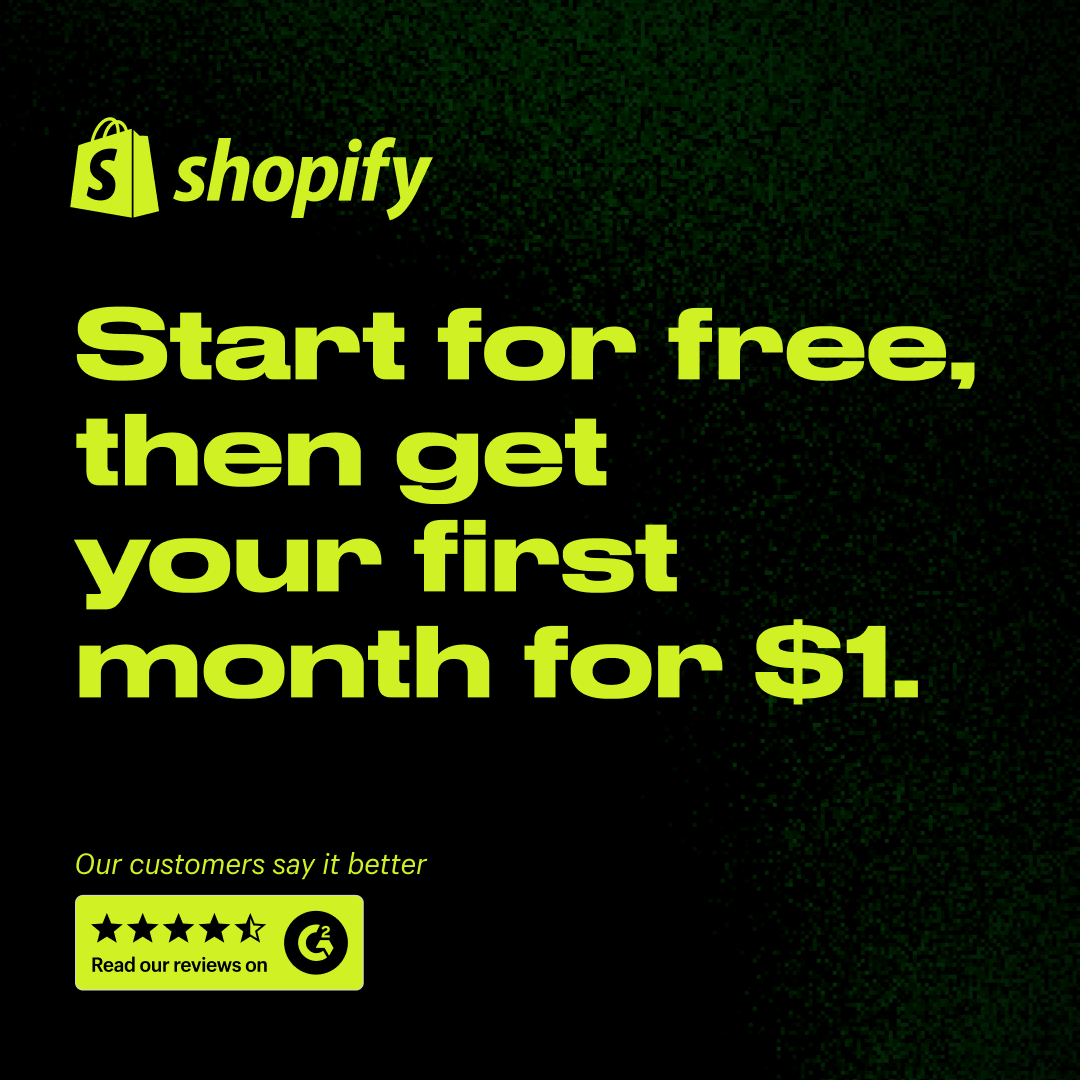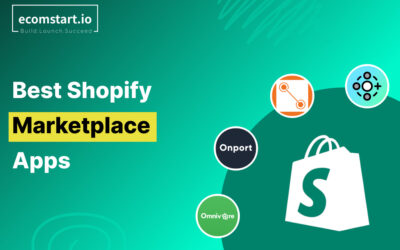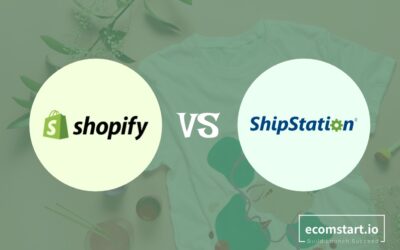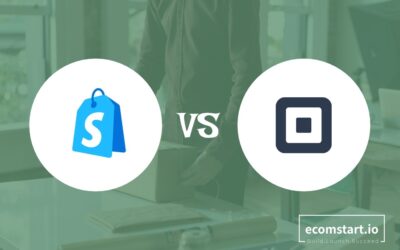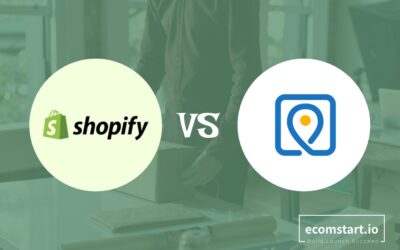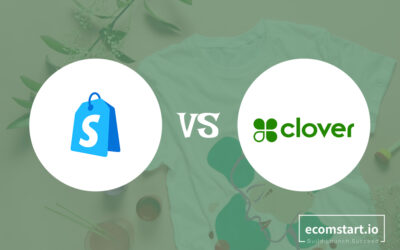Shopify vs Clickfunnels: The Ultimate Comparison Guide
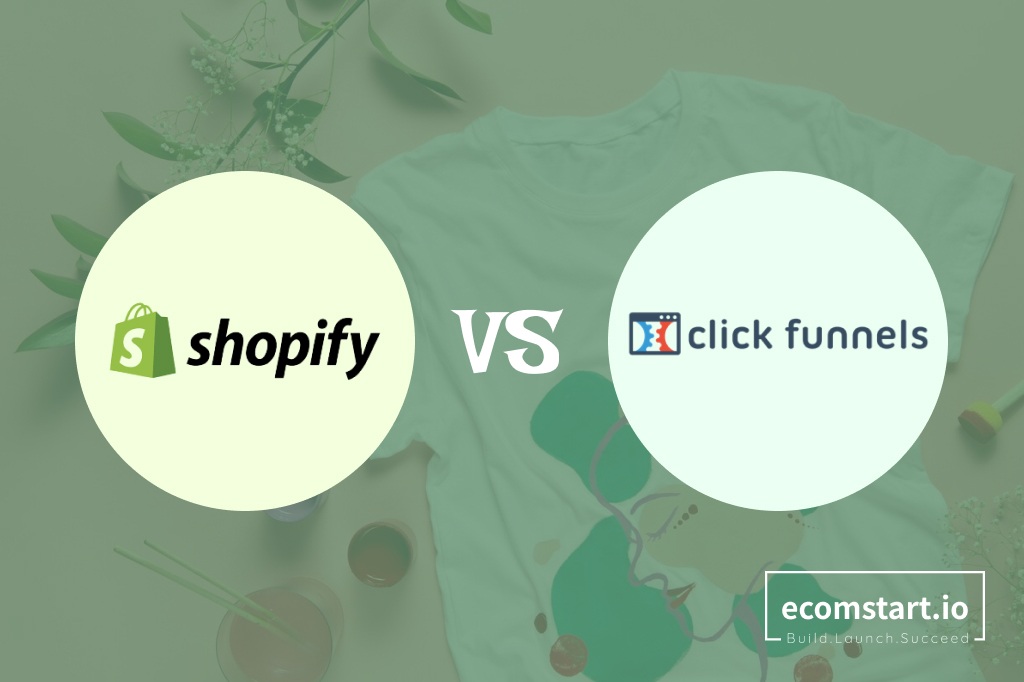
This is the final Shopify vs Clickfunnels comparison. If you cannot make up your mind and figure out which platform to choose for starting an eCommerce business, then this article should be useful in making a sound decision.
In this tutorial, we will discuss the main characteristics, price policy, strengths, and weaknesses of both services while directly addressing your questions and offering straightforward solutions to your conflicts. Knowing the difference between Shopify and Clickfunnels is vital to your business growth, and we want to make that process easy for you.
This guide is practical, cost-effective, and designed to assist you in making the best decision based on your specific requirements. So let’s dive in!
Contents
1. Shopify vs Clickfunnels: An overview
Before delving into some nitty-gritties, to compare such platforms like Shopify and Clickfunnels, first of all let’s get a grasp on what Shopify is and the ground it plays in e-commerce solutions.
Shopify is a universal ecommerce platform. It is designed to help you set up and run your e-commerce store. Shopify includes an entire range of everything, starting from inventory management to payment gateways. This is ideal for immediate product selling and requires a full-fledged online store.
In contrast, Clickfunnels is focused on sales funnels. It’s an instrument that has been developed to construct a chain of webpages guiding your clients in the direction of product purchase. Clickfunnels is ideal for businesses that want to make their sales process as efficient as possible.
In this sense, Shopify is about creating a full-cycle online store, while we are talking about Clickfunnels in terms of building functional sales funnels. Although both have unique functions, when used appropriately they can be effective tools for your online business.
2. Comparison table of Shopify vs Clickfunnels
Regardless of whether you sell physical products, digital services, or even information courses, having optimized sales funnels is essential if you want to convert your visitors into loyal buyers. Several popular platforms – Shopify and Clickfunnels both claim to make this possible but target different needs and abilities.
This comparison table provides detailed insight into eight key aspects of both systems including price, design, analytics, and support allowing you to choose what platform suits best your business objectives. Thus, let us compare Shopify with ClickFunnels and see who is the winner for your particular needs.
| Feature | Shopify | ClickFunnels | Key Takeaway |
| Pricing | $25/month – $399/month | $127/month – $297/month | Shopify wins for affordability. ClickFunnels is much pricier but has lifetime pricing on some of the higher tiers. |
| Design and Templates | Wide variety of themes, both free and paid versions, with more customization options. | Limited pre-designed funnels, but well customizable within each funnel. | Draw. Shopify offers a greater variety of choices but the templates on ClickFunnels are tailored for conversion. |
| Ease of Use | Drag-and-drop interface, easy to use for beginners, numerous resources. | A steeper learning curve and more technical knowledge are required but the community is very supportive. | Shopify wins for beginners. ClickFunnels caters to experienced entrepreneurs. |
| eCommerce features | Powerful inventory management, shipping integrations, tax calculations, etc. | Has simple inventory management, few built-in features, and depends on third-party integrations. | Shopify wins for managing an entire online store. ClickFunnels specializes in individual sales funnels. |
| Sales funnels | Needs other apps to create funnels. | Pre-built sales funnels for different purposes, simple to set up and optimize. | ClickFunnels is the winner for dedicated sales funnel functionality. Funnel building on Shopify takes more work. |
| Analytics | In-depth sales and customer information; customizable reports. | It concentrates on funnel metrics, conversion rates, and so forth. | Draw. They are both good analytics, but serving different niches. |
| Apps & Integrations | Unlimited app store that has millions of integrations for all demands. | Poor built-in integrations depend on Zapier To connect with third parties. | Shopify wins for deep app integrations. Additional fees may be required for integrations with ClickFunnels. |
| Help and support | Detailed documentation, live chat, and community forum. | Email and live chat support, active community forum. | Draw. They both provide a good selection of support services, but Shopify has more resources. |
>>> Learn more: Shopify vs Salesforce Commerce Cloud : Which one is better?
3. Clickfunnels vs Shopify: Full comparison
3.1. Pricing
Let’s dive deeper into our Shopify vs Clickfunnels comparison by looking at one crucial factor: Pricing.
When talking about Shopify, their pricing ranges from $25 per month for the Basic Shopify plan. All the components needed for starting a new business are in this package. Shopify provides a plan for $65 per month to growing businesses and an Advanced Shopify plan with $299 costs on every month.

Alternatively, Clickfunnels begins at $127.84 per month. The plan enables you to design twenty funnels, and one payment gateway and offer 10,000 contacts. The Clickfunnels Platinum Plan for advanced Analytics and unlimited funnels is $208.50 per month.
A Shopify store ‘All Birds’ applies the versatile functionalities of its platform to manage a huge array of eco-friendly footwear. On the other hand, a one-product store like ‘Snug Blankets’ uses Clickfunnels to effectively lead its customers down the sales funnel toward purchasing its best-selling product.
Our verdict: In the pricing showdown between Shopify and Clickfunnels, Shopify takes the crown. It offers a lower initial cost and a broader range of options suitable for all business sizes.
3.2. Design and Templates
Let’s continue our Shopify and Clickfunnels comparison by looking at another crucial aspect: Design and Templates.
Shopify is popular for a variety of attractive responsive templates. For instance, a leading Shopify store ‘Fashion Nova’ displays their products in visually appealing layouts that are user-friendly as well.
However, Clickfunnels also has many design options but primarily focuses on conversion enhancement. An example is Snug Blankets which uses a simple, directive design to lead customers through the purchasing process.

Our Verdict: In the design and templates face-off between Shopify and Clickfunnels, it’s a draw. Shopify excels in aesthetics, while Clickfunnels shines in conversion-optimized designs. Your choice hinges on whether you value looks or conversion optimization more.
3.3. Ease of use
Let’s dive into another key feature in our Shopify vs Clickfunnels comparison: Ease of Use.
First, Shopify provides an easy-to-use drag-and-drop interface even for first-time users. So, the ease of use has been used by So Aesthetic as a Shopify store to create an engaging and functional website. There are also numerous resources on how to use Shopify even for beginners.
By contrast, Clickfunnels has a bit of a steeper learning curve that may require some technical knowledge. However, companies such as ‘The LadyBoss Movement’ have been able to fully leverage Clickfunnels to guide their customers seamlessly through their offerings. One major benefit of Clickfunnels is its strong community support that can assist you through any obstacles.
Our Verdict: When it comes to ease of use, Shopify takes the lead. With its user-friendly interface and supportive technical assistance, it’s a perfect match for beginners in e-commerce. While Clickfunnels is feature-rich, it requires more time and technical know-how to master.
3.4. eCommerce features
At a closer look, let’s discuss the eCommerce aspects of our Shopify vs Clickfunnels comparison.
To begin with, eCommerce is where Shopify excels. For instance, So Aesthetic is a renowned Shopify store that uses Shopify’s sophisticated inventory management, shipping integrations, and tax calculations to simplify its procedures. This wide range of built-in functions makes managing an online store much easier.

On the other hand, Clickfunnels has a simpler inventory management platform. For instance, ‘The Ladyboss Movement’ depends heavily on third-party integrations to boost its eCommerce functionality. Although running a successful store using Clickfunnels is still possible, some additional work might be needed.
Our Verdict: In the eCommerce features round, Shopify emerges victorious. Its comprehensive built-in eCommerce functionalities outshine Clickfunnels, which relies heavily on integrations. Shopify is your go-to if you seek robust, inbuilt eCommerce tools.
3.5. Sales funnels
The next important thing to discuss in this Shopify and Clickfunnels battle is sales funnels.
With Shopify, the construction of sales funnels is often through other apps. For instance, a Shopify store ‘So Aesthetic’ can have no other choice but to deliver third-party applications for developing sales funnels and this will make the process difficult in addition to being expensive.
However, Clickfunnels is designed for funneling sales. Such entities as ‘The Ladyboss Movement’ can benefit from ready-made sales funnels for different purposes that are easy to set up and improve. This functionality facilitates the optimization of the customer journey and improves conversion levels.
Our Verdict: The winner is Clickfunnels. Its ready-made sales funnels are one of the main features that sets it apart from Shopify in this area. Clickfunnels is most probably the tool you will opt for if your primary goal is to develop efficient sales funnels.
3.6. Analytics
Let’s now dive into the analytics element of our Shopify and Clickfunnels assessment.
Shopify offers in-depth sales and customer information. For instance, a Shopify store like ‘Hiut Denim Co.’ can use the customizable reports offered by Shopify to analyze sales data and help in making suitable business decisions based on the information.
In contrast, Clickfunnels emphasizes more on the performance of funnels and metrics like conversion rates. Companies such as ‘The Ladyboss Movement’ can use these insights to improve their conversion rates by optimizing their sales funnels.

Our Verdict: In the analytics showdown between Shopify and Clickfunnels, it’s a tie. While Shopify delivers key insights into sales and customer data, Clickfunnels stands out with its funnel performance metrics. Your pick depends on your unique needs and goals.
3.7. Apps & Integrations
In our Shopify and Clickfunnels comparison, let’s consider apps and integrations.
Shopify has a huge app store with thousands of integrations to meet all your requirements. A Shopify store such as ‘The Great Frog’ can improve their online shop by adding many apps for marketing, SEO, customer service, and others. This allows Shopify users to design their store as per their wishes.
Contrastingly, Clickfunnels has few built-in integrations. ‘The Ladyboss Movement’ may have to depend on Zapier for certain third-party connections. This still provides some flexibility, but it might not provide as many options as Shopify.
Our Verdict: In the Apps and Integrations round of Shopify vs Clickfunnels, Shopify takes the crown. With its extensive app store and superior customization capabilities via diverse integrations, it’s your best bet for a platform with plentiful apps and integrations.
>>> Learn more: Shopify vs Lightspeed: Which Comes as the Optimal Solution?
3.8. Help and support
Let’s now get help and support in our Shopify and Clickfunnels comparison.
As far as Shopify is concerned, there is detailed documentation, live chat, and a community forum. For instance, using these resources, ‘Fashion Nova’, a successful Shopify store can promptly find answers to their questions.
In contrast, Clickfunnels provides both email and live chat support in addition to an active community forum. This implies that firms such as ‘The Ladyboss Movement’ can quickly get assistance and engage with other users for insights or guidance.

Our Verdict: It’s a draw between Shopify and Clickfunnels. Both platforms provide robust support services. Your preference between Shopify’s comprehensive documents or Clickfunnels’ email support will tip the scale.
4. Shopify vs Clickfunnels: The verdict
Finally, we decided on our Shopify and Clickfunnels comparison. After weighing all the factors, here’s what we’ve concluded:
For a wide choice of apps and integrations – go with Shopify. It is designed to suit companies specializing in a wide range of products and offers comprehensive sales and customer analytics. What is more, its all-embracing support facilities guarantee that you are never left on your own.
Select Clickfunnels when you want to build the most efficient sales funnels. This platform is particularly effective in lead generation and conversion rate optimization. Its strong email and live chat support, in addition to the active community forum, makes it simple to find help when necessary.
In other words, Shopify and Clickfunnels are powerful tools that have distinct characteristics. Your final preference should relate to the business-specific needs and goals. Whether it is creating a large online shop or developing customized marketing plans, both these platforms have you covered.
5. Conclusion
So, here we are with our final comparative guide on Shopify and Clickfunnels. It will largely depend on your business requirements. Shopify is the one you should go for in case your plan includes a full-scale online store that provides various lines of products. But if it’s about developing dynamic sales funnels, then Clickfunnels is your pick.
Looking beyond Shopify and ClickFunnels? Explore a wider selection of eCommerce platforms! While “free Shopify alternatives” exist, these might have limitations compared to paid options. Consider comparing features across different platforms to find the one that best fits your budget and business needs.
Bear in mind that in e-commerce there is no all-purpose product. But this all requires you to remember what works for you and your business. This manual is designed to guide you in determining the best choice suitable for your case. For more in-depth manuals and recommendations, visit ecomstart.io. Here at eComStart, we are committed to assisting you in overcoming the challenges associated with e-commerce. Happy selling!
6. FAQs
Clickfunnels vs Shopify dropshipping: Shopify wins the round on full stores with advanced inventory & growth plans. If your main focus is on sales funnel and lead conversions, ClickFunnels wins – even though there are fewer e-commerce possibilities available. Evaluate your need for advanced e-commerce and powerful sales funnels before choosing.
And if your end goal is to sell actual tangible products, then Shopify may be the better of both Clickfunnels 2.0 vs Shopify as recommended by the majority. The platform provided by Shopify is organized in such a way as to be used for e-Trade because it offers great functionality for inventory management and tracking as well as smart tools developed specifically for shipping needs and product counting.
Although Clickfunnels 2.0 advances in some features, the software has regards to lead generation and optimization of conversions because it is weak when it comes to its capabilities in managing an online store. Thus, in terms of selling tangible products, Shopify becomes the preferable solution as its features are more specific to eCommerce.
The answer is yes – it’s possible to implement ClickFunnels into Shopify This duo makes it possible to employ ClickFunnels for lead generation and conversions while utilizing Shopify when conducting your e-commerce-related activities. It is enjoyable from both corners!

